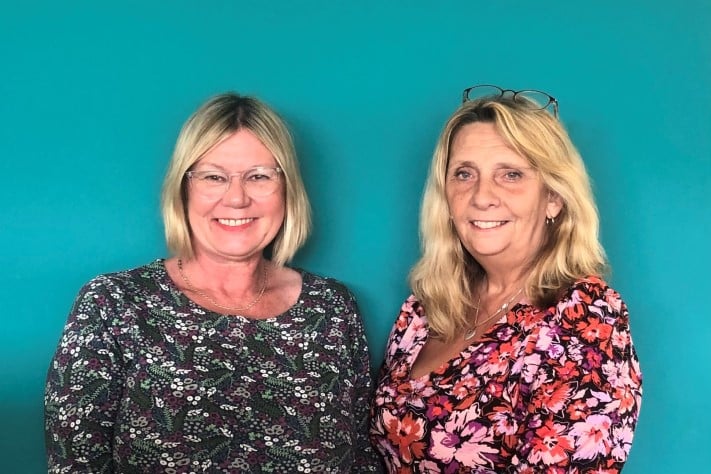14th June 2024
In support of Infant Mental Health Awareness Week #IMHAW2024, we are delighted to share this great Voices blog as Lead Nurse, Andrea Bevan, interviews Julie Powell-Jones, Parent Infant Relationship Project Manager, on the development of Cwm Taf Morgannwg ‘Baby and Toddler Voice’.

From left: Julie Powell-Jones: Parent Infant Relationship Project Manager, Cwm Taf Morgannwg; Andrea Bevan: Lead Nurse, Children and Young People and School Nursing, Cwm Taf Morgannwg
- Tell me about your role as a Parent Infant Relationships (PIR) Project Manager, Julie?
I’m lucky to have such a lovely job! I come from a nursing background, and have also worked as a midwife, health visitor and Healthy-Schools Lead. This work involves joining forces with Early Years’ colleagues and the Clinical Lead to shape a service that supports parenting and the establishment of secure parent-infant relationships across the first 1000 days, from conception up to the age of 2 years.
- What do you mean by a secure parent-infant relationship?
The essence of a child’s wellbeing, both emotional and physical, is dependent on the parent-infant relationship. Early experiences with parents, siblings, other relatives, and caregivers affect how children form relationships, learn, and experience and regulate their emotions and behaviour. A secure parent-infant relationship is a core component of resilience and a child’s ability to weather life’s ups and downs.
- Tell me about how the work started in Cwm Taf Morgannwg (CTM) on the Baby and Toddler Voice?
Last year I was recruited as the PIR Project Manager by the CTM Early Years Transformation Programme (EYTP). The ambition of the EYTP (2018-2024) was to deliver on the Welsh Government’s (WG’s) National Strategy ‘Prosperity for All’ “to create a more joined-up, responsive system that puts the unique needs of each child at its heart” (p.23).
In October 2023, the EYTP supported a PIR Conference. Over 120 experts working regionally across the CTM early years system attended. One workshop, supported by Children in Wales, was designed to capture views on three questions written through the ‘Voice of the Infant’. This term is used to convey an understanding that babies have their own minds and want to communicate from birth. The questions were influenced by Scotland’s ‘Infant Pledge’.
Three questions were posed to the attendees to consider:
- Create a series of expectations that ‘I should’ (a baby/ pre-verbal infant) expect from my main care givers that would support my optimal emotional, social and cognitive brain development.
- Create a series of expectations that ‘my important adults’ would need, to nurture my emotional, social and cognitive brain development.
- Create a series of expectations that ‘I’ can expect from my environment, to support my emotional, social and cognitive brain development
- What was the outcome from the workshop?
The workshops generated wide-ranging responses from partners working across the first 1000 days. These were captured and later segmented using thematic analysis into subject-based categories.
These insights provided the basis for four multi-agency Task and Finish Groups where the responses were shaped into 15 statements, written through the voice of the baby.
- Were service-users involved?
Service-user engagement was facilitated in February 2024. Four mothers with babies were asked their thoughts on three shortened questions. Their feedback provided an additional valuable insight into the practicalities of accessing information, support, venues and public spaces and being emotionally available as they transition as a parent.
- What happened next in the CTM Baby and Toddler Voice journey?
The 15 CTM Baby and Toddler statements were mapped to the Welsh Government’s NEST/ NYST Framework, designed to ensure a whole system approach for developing mental health, wellbeing and support services for babies, children, young people and their families. The Children’s Commissioner’s Team also mapped the statements to the United Nations Convention on the Rights of the Child (UNCRC).
- What impact are you hoping the CTM Baby & Toddler Voice will have?
The impact of the Baby and Toddler Voice will need to be considered across the wider system. This may vary depending on the individual group or organisation. We hope that it will have wide ranging impacts:
- (i) Impact on staff
- A greater understanding of the important uniqueness of the F1000 within the UNCRC
- A greater level of sensitivity and understanding of the voice, rights and needs of the pre-verbal infant by considering their perspective, feelings and emotions in all matters concerning them.
- (ii) Impact on institutions
- A change in organisational culture towards greater recognition of the unique needs of the pre-verbal infant and changing the narrative from ‘Children and Young People’ to ‘Babies, Children and Young People (BCaYP)’.
- (iii) Impact on families/ community
- Greater awareness in seeing the baby as an individual, with thoughts, feelings and emotions;
- Greater awareness of the nurturing environment and behaviours surrounding a pre-verbal infant, and how this will impact their emotions and feeling of safety.
- What next for the CTM Baby & Toddler Voice?
Babies and infants are instinctive communicators. However, grown-ups are not instinctive listeners and, if we are to fulfil our obligations under the UNCRC, the voices of all BCaYP need to be heard.
Conversations and staff engagement sessions are ongoing with CTM partners as part of its consultation. It is hoped to launch the CTM Baby and Toddler Voice later this year.
For more information contact [email protected] or [email protected].






